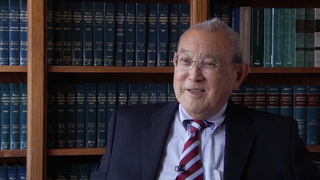Interviews
Response to loyalty questionnaire
My parents didn't say very much, except that they said, What good is your citizenship? You claim that you're Americans, and you were so proud of your citizenship, but here it didn't mean anything. We were in camp just like the Isseis, and we didn't have no say-so or anything. So they didn't, they, of course, thought, Why in the world would anyone want to volunteer, go into the army and fight for the United States, to give up their life for a country that had them imprisoned? So I think that it was a logical thought for Isseis to think that way, because here we were, we were all in the same boat.
Date: September 15-17, 2004
Location: Washington, US
Interviewer: Alice Ito
Contributed by: Denshō: The Japanese American Legacy Project.
Explore More Videos

Going to camp with the Terminal Island people
(1927-2010) Political Activist

The lawsuit set the standard for restoring people’s rights
(1927-2010) Political Activist


Interned at age fifteen, I saw camp as an adventure
(1927-2010) Political Activist


Being Denied as a Japanese American Lawyer
(b. 1934) The First Japanese American Appointed to the U.S. Court of Appeals.


Returning to Japan after studying in New York
(1940-2016) Issei Landscape Architect

Discrimination faced in San Francisco (Japanese)
(b. 1937) A war bride from Yokohama

The riot in Manzanar
(b. 1921) Nisei veteran who served in the occupation of Japan

Accepted by Japanese society as I learned more Japanese (Japanese)
(b. 1979) Sansei Nikkei Brazilian who lives in Oizumi-machi in Gunma prefecture. He runs his own design studio.

Unique Identity from Having Multiple Backgrounds
(b. 1938) Philipines-born hikiagesha who later migrated to the United States.

Father was convinced the constitution would protect him
(b. 1935) Sansei businessman.


The lack of discussion about family’s incarceration in Amache
Sansei judge for the Superior Court of Los Angeles County in California
